Key takeaways:
- Salary negotiation is about understanding your value and encompasses overall compensation, not just salary figures.
- Researching your market value through salary comparison websites and peer discussions empowers your negotiation position.
- Effective communication, including active listening and confident body language, greatly impacts the outcome of negotiations.
- Following up after negotiations with a thank you note and clarifying discussions helps maintain connections and demonstrates continued interest.
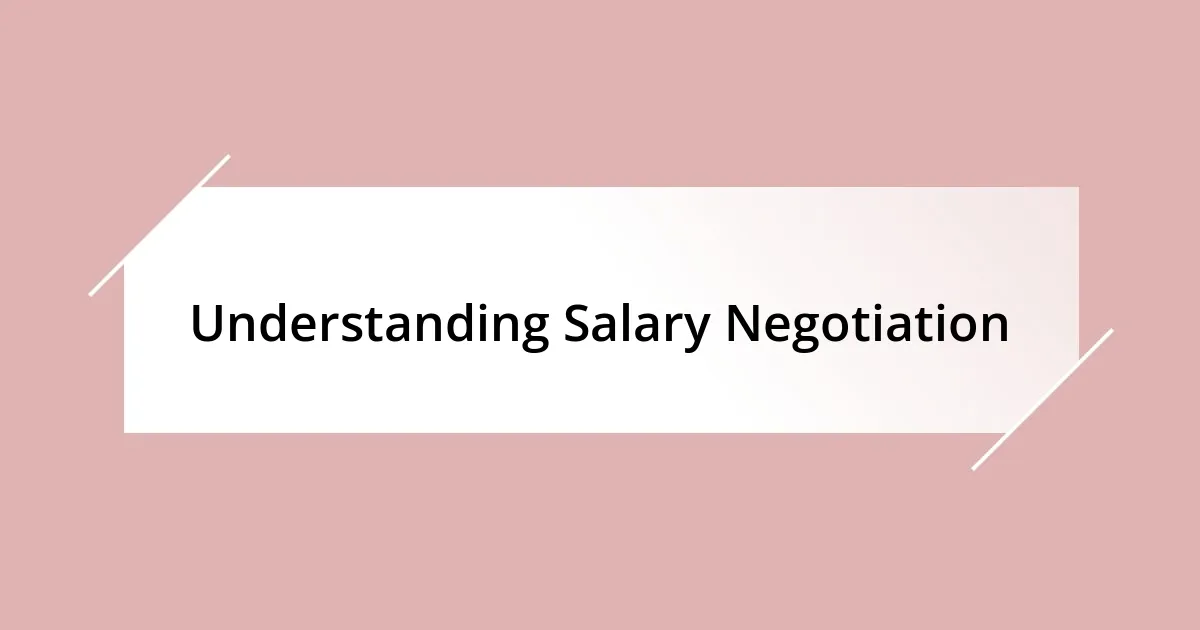
Understanding Salary Negotiation
Salary negotiation is often seen as a daunting process, but it’s really just a conversation about what you’re worth based on your skills and experiences. I remember my first job offer; I felt a mix of excitement and anxiety. How could I confidently ask for more without sounding greedy? That moment taught me that negotiation isn’t just about the numbers; it’s about understanding your value in the market.
When negotiating, it’s essential to approach the conversation from a place of self-awareness. I often reflect on past experiences and accomplishments before entering discussions. For instance, I once prepared a list of my contributions to previous teams, and it gave me the confidence to present a compelling case. Have you ever thought about what unique value you bring to an employer? Identifying that can change everything.
Remember, salary negotiation isn’t strictly about the salary itself; it encompasses benefits, work-life balance, and growth opportunities. I’ve learned to look at the entire package rather than just the dollar signs. This becomes even more crucial in industries with varying compensation structures. How often do we overlook what matters most to us personally? A holistic view can make a world of difference in achieving satisfaction with your compensation.

Researching Your Market Value
Researching your market value is a crucial step in salary negotiation. I remember when I realized the importance of this process while preparing for a promotion. I took time to scour salary comparison websites and look up industry reports, and it was eye-opening. These resources helped me understand how my skills measured up against others in my field, giving me a solid foundation for my negotiation.
When I began talking to peers in similar roles, I found that open dialogue was incredibly helpful. We shared insights on our experiences, which not only made me aware of salary ranges but also revealed the nuances of our job roles. This conversation made me feel more empowered. Have you ever connected with peers about compensation? It’s amazing how much information can be exchanged when we break the ice.
Lastly, I often turn to professional networks and LinkedIn for salary benchmarks. Joining industry groups and forums can provide updated insights into compensation trends. This strategy has been a game changer for me. Did you know that many organizations share their average salaries publicly? Tapping into these community resources can help you not just survive but thrive in salary negotiations.
| Resource Type | Example |
|---|---|
| Salary Comparison Websites | Glassdoor, PayScale |
| Industry Reports | Robert Half Salary Guide |
| Professional Networks | LinkedIn Groups |
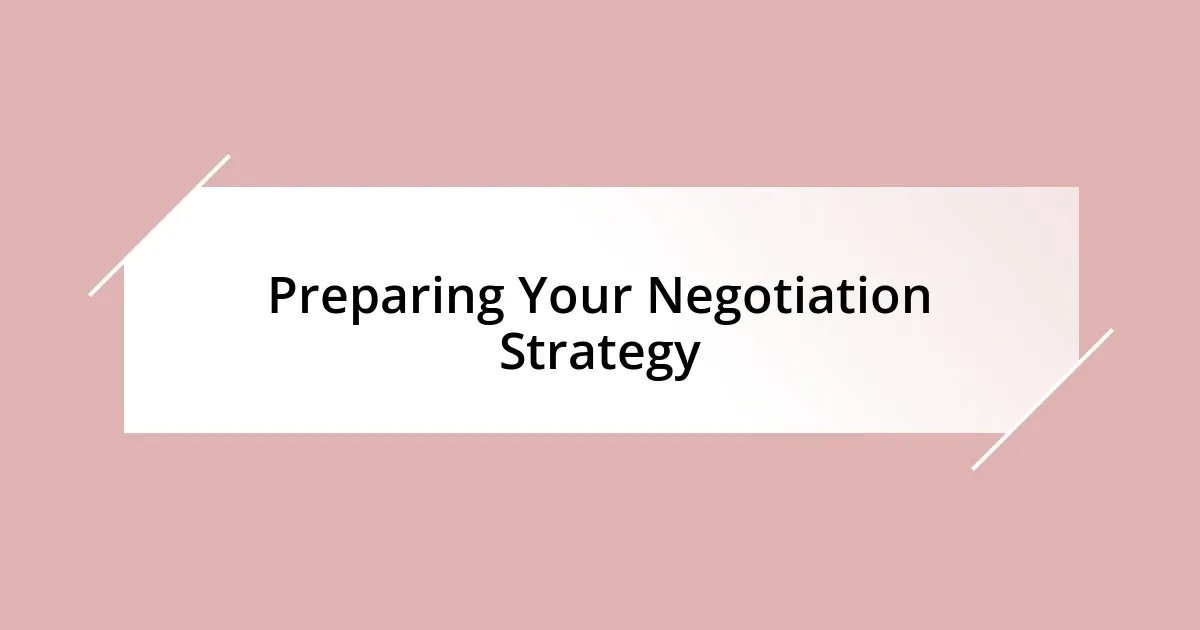
Preparing Your Negotiation Strategy
Preparing your negotiation strategy requires thoughtful consideration and reflection. I recall one instance where I sat down and created a detailed plan before a crucial negotiation. It wasn’t just the numbers I focused on; I visualized the conversation, anticipating possible questions and responses from my employer. This preparation alleviated my nerves and instilled a sense of control.
Here are key steps you can take to prepare effectively:
- Set Clear Goals: Know what you want from the negotiation and set realistic targets.
- Practice Your Pitch: Rehearse your key points until you feel confident presenting them.
- Anticipate Counterarguments: Consider what the other party might say and prepare responses.
- Know Your Bottom Line: Define the minimum acceptable offer you’d be willing to accept.
- Plan Your Timing: Choose the right moment to initiate the conversation for maximum impact.
In reflecting on this process, I often think back to the importance of emotional intelligence. Understanding not just the numbers, but the feelings behind the negotiation can amplify your effectiveness. I’ve learned to tap into my empathy, recognizing that the other party may have their own pressures and limitations. This insight helped me navigate negotiations with a collaborative spirit rather than an adversarial approach, leading to more successful outcomes.
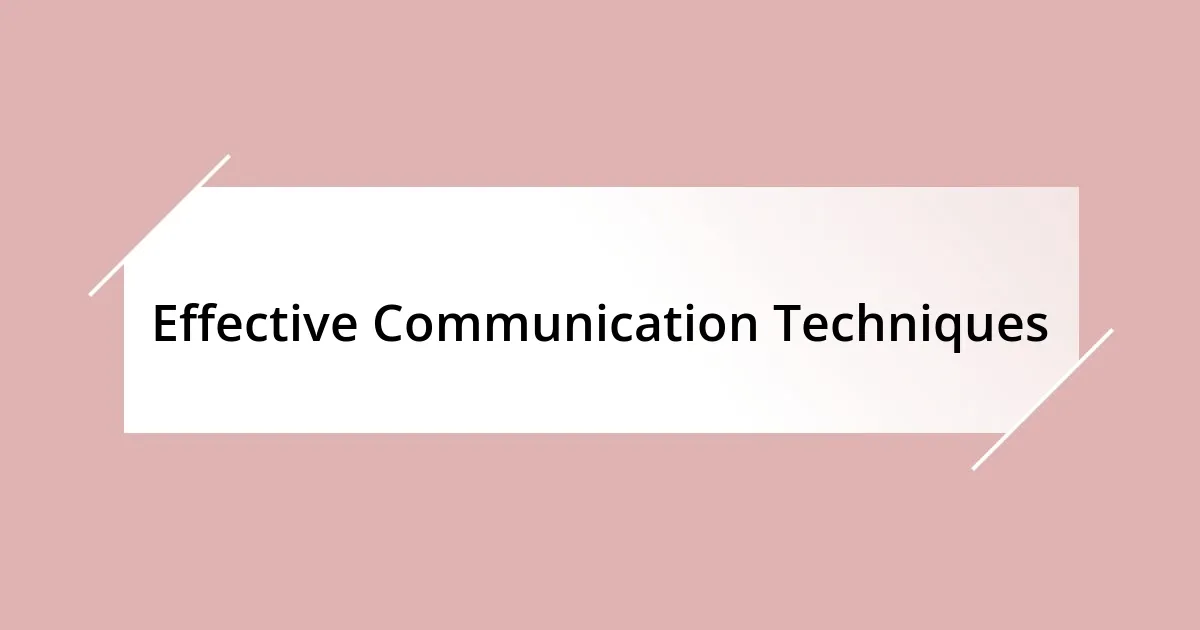
Effective Communication Techniques
Effective communication isn’t just about the words we choose; it’s about how we convey our message and connect with the other person. I recall a time during a negotiation when I adopted a calm, assertive tone instead of the nervous, rushed manner I usually used. It made a world of difference. When we communicate with confidence, it not only strengthens our position but also helps to foster trust and respect.
Another key technique I’ve found beneficial is active listening. During one of my discussions, I focused intently on what my manager was saying, nodding and paraphrasing their points to show I understood. This practice not only made them feel heard but also allowed me to tailor my responses more effectively. Have you ever realized how powerful a pause can be? It gives us, and the other party, a moment to reflect on what’s being said, which can lead to more thoughtful responses.
Lastly, non-verbal communication plays a significant role in negotiations. I remember a situation where maintaining eye contact and an open posture helped change the dynamics of the conversation. These small gestures can convey confidence and openness. Did you know that our body language can often communicate more than our words? Being aware of both verbal and non-verbal cues can drastically improve the quality of the interaction and help to bridge any gaps in understanding.
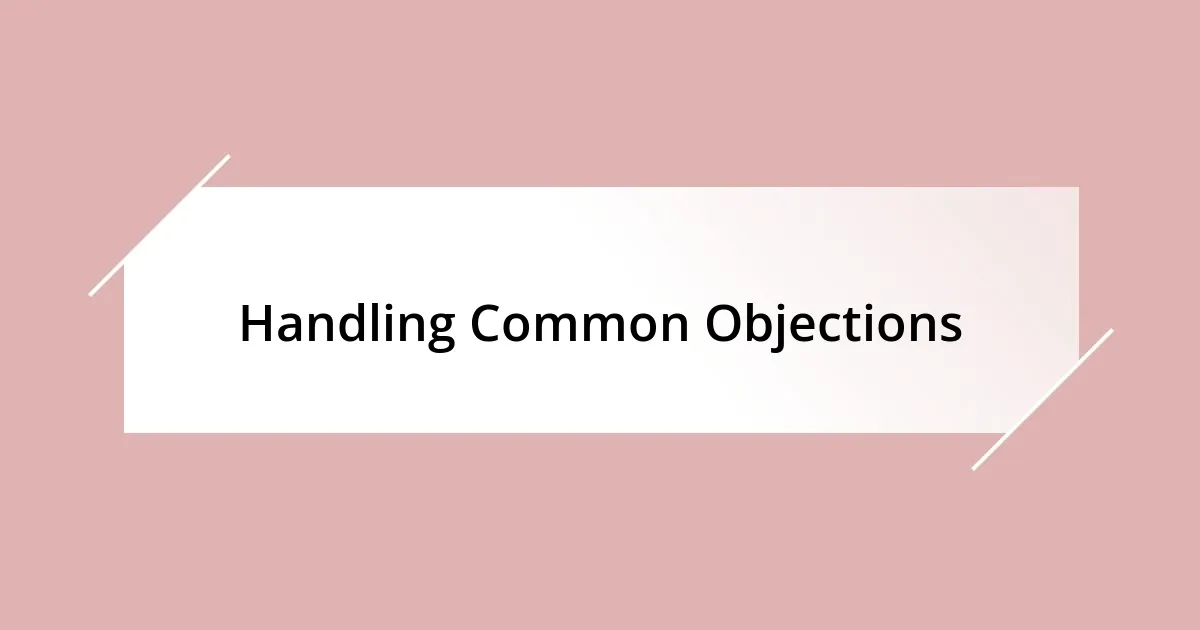
Handling Common Objections
When faced with objections during salary negotiations, my approach is to remain composed and engage in a constructive dialogue. I remember a time when my employer expressed concerns about budget constraints. Instead of reacting defensively, I asked clarifying questions to understand their perspective better. This not only eased the tension but also opened the door for discussing creative solutions, like performance-based bonuses, which turned a roadblock into an opportunity.
Another common objection I’ve encountered is the “We cannot pay you what you requested” statement. In those moments, I’ve found it helpful to share the value I bring to the table. I recall citing my past performance metrics, which demonstrated my contributions to the team. It’s amazing how that data shifted the conversation from limitations to possibilities. By framing the negotiation in terms of mutual benefit, I could pave the way for a more tailored offer.
Lastly, dealing with objections can sometimes evoke frustration, but I’ve learned to view them as invitations to clarify and negotiate further. I vividly remember a situation where my proposal was met with skepticism. Instead of feeling disheartened, I embraced the challenge by asking, “What concerns do you have?” This question not only showed I was open to feedback but also allowed me to address misconceptions directly, often leading to a more collaborative atmosphere. How have you navigated similar situations where objections could have derailed your goals?
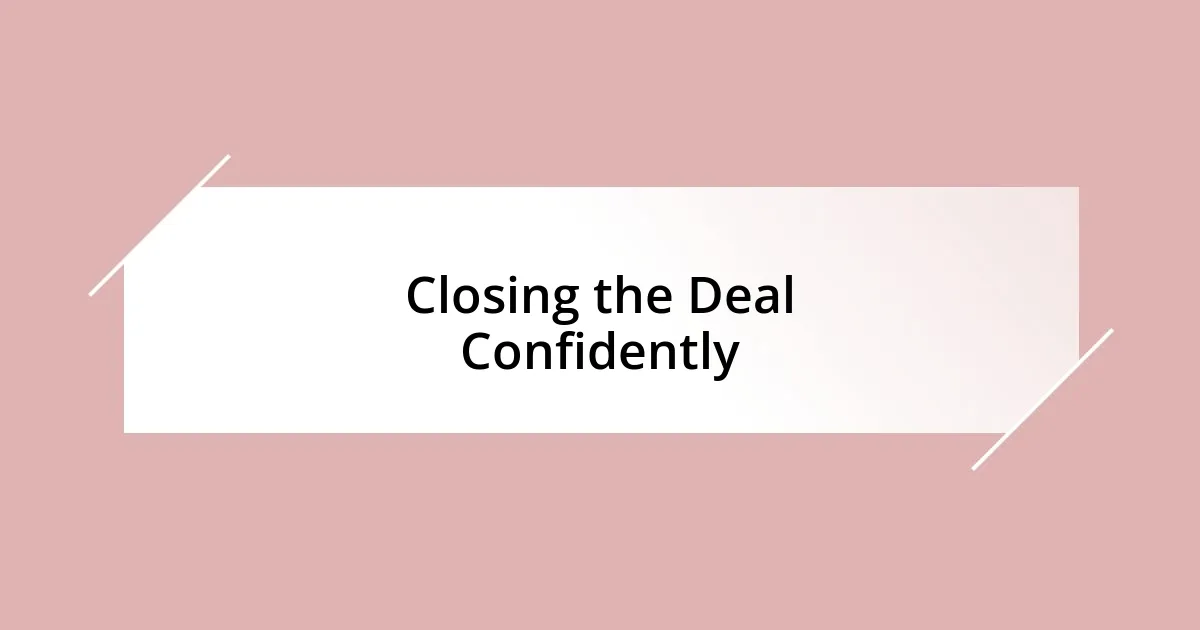
Closing the Deal Confidently
When it comes to closing the deal confidently, it’s all about owning your worth. I remember sitting across from a hiring manager, feeling the weight of the moment. Instead of feeling intimidated, I focused on presenting my case with clear evidence of my skills and contributions. I often ask myself: How can I make the other party see my potential? Articulating my value transformed the atmosphere from tension to a genuine exchange, allowing us to close the discussion positively.
One thing I’ve learned is that the final moments of a negotiation can be pivotal. After placing my salary request on the table, I took a deep breath and paused. There was an uncomfortable silence, but in that pause, I could almost see the wheels turning in their mind. It made me think, isn’t it interesting how sometimes a well-timed silence can say more than words? By maintaining calm confidence during that moment, I could re-establish the focus on my qualifications and the mutual fit, leading to a successful agreement.
I’ve discovered that expressing excitement about the opportunity can also work wonders. I vividly recall closing a deal where I conveyed enthusiasm about joining the team, reflecting my eagerness to contribute positively. That emotion was infectious; it not only made the negotiation smoother but also reinforced my commitment to the role. How often do we forget that our excitement can be a powerful negotiation tool? Being authentic and showing genuine passion can lead to a win-win situation for both parties.

Following Up After Negotiation
Following up after a salary negotiation is crucial. I’ve learned the hard way that sending a thoughtful thank you email can reinforce a positive impression. After one negotiation, I made it a point to express gratitude for their time and consideration. It felt sincere and helped maintain a connection, ensuring my candidacy remained fresh in their minds.
One time, I didn’t receive a response immediately. Instead of feeling disheartened, I took a proactive step and followed up a week later. I simply checked in to see if they had any updates regarding my proposal. That small nudge proved impactful; it demonstrated my continued interest while also reminding them of our discussion. Isn’t it fascinating how a little persistence can keep the dialogue alive?
In my experience, clarity is key when following up. I remember one situation where I summarized the main points of our conversation to ensure we were on the same page. This not only reinforced my understanding but also showed I was serious about the offer. Have you ever felt unsure about the details after a negotiation? Crafting a concise recap can eliminate ambiguity and solidify the foundation for any further discussions.














